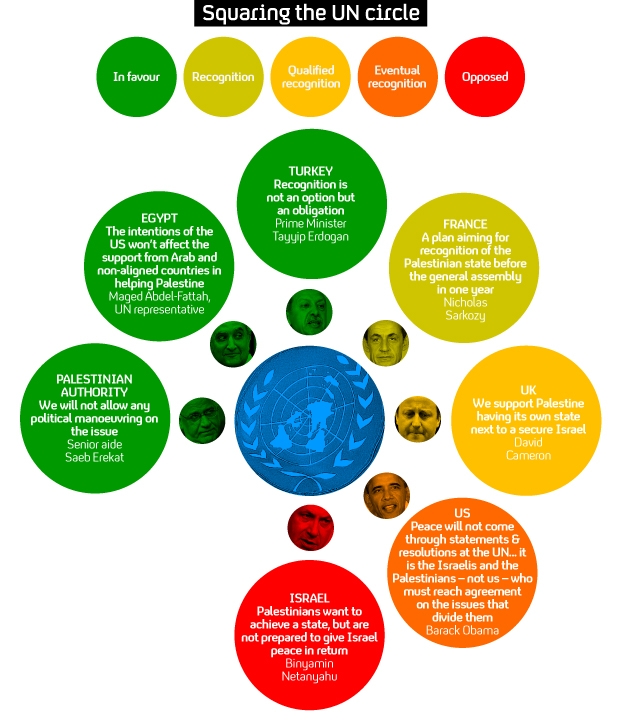Middle East in flux as Palestinians go to UN
The Arab spring, Nato’s Libya campaign, and next year’s US elections are all factors affecting the Palestinian Authority’s move this week to press for recognition at the United Nations.

The past year has not been plain sailing for any of the main players in this week’s UN negotiations over Palestinian recognition at the United Nations.
Mahmoud Abbas, president of the Palestinian Authority, who is leading the bid for recognition, was exposed in a leak of confidential documents to broadcaster Al Jazeera in January 2011.
The papers showed the Palestinians had agreed major concessions during secret negotiations with Israel, including the annexation of all but one illegally built Israeli settlement in east Jerusalem.
In addition, the leak reinforced the division between the secular, Fateh-led PA and Hamas, the Sunni Islamic group which controls the Gaza Strip. It emerged that PA leaders had been tipped off about the short-lived war between Fatah and Israel at the end of 2008 and into 2009.
Co-operation agreement
Nonetheless, in April 2011, President Abbas signed a cooperation agreement with his Hamas counterpart, Khaled Meshaal. Both sides aim to form a joint caretaker government after elections next year. Hamas, though, is committed to the destruction of the state of Israel.
Symbolic actions to isolate Israel at the UN won’t create an independent state. US President Barack Obama
The following month US President Obama attacked the Fatah-Hamas pact and repeated his request that the Palestinians drop plans to appeal for recognition at the United Nations.
In a speech to the American Israel Public Affairs Committee, the US president warned that “symbolic actions to isolate Israel at the United Nations in September won’t create an independent state”.
And Mr Obama dismissed Hamas’s aspirations, stating: “No country can be expected to negotiate with a terrorist organisation sworn to its destruction.”
Uneasy situation
The main parties involved are not “easy partners”, according to Pini Meidan, a former Israeli foreign policy adviser.
He told Channel 4 News: “The Israeli coalition finds it almost impossible to take any long-term strategic decision, the Palestinians are between Gaza and the West Bank, and the US is entering into election year with Obama saying the right things but never acting upon them. This creates an uneasy situation.”
The Middle East is in flux, and Egypt and Turkey have downgraded their relationships with Israel. Barak Seener, Middle East analyst
Latest reports from New York suggest that the Palestinian Authority, despite pressure from EU nations including the UK and France, will press for a vote on recognition in return for a new round of peace talks.
Israel’s Prime Minister Netanyahu, meanwhile, will have been pleased to receive an endorsement of his country’s position from the United States.
His previously distant relations with Barack Obama – who famously walked out on him at the White House in March in frustration at his apparent intransigence – were forgotten on Wednesday when the US president spoke at length about the tribulations of the Israeli people.
Realignment of influence?
Israel, the United States and the Palestinian Authority may be the main players at the United Nations this week, but they are not alone. The Arab spring has seen a realignment of influence, both within the Middle East and outside it.
Barak Seener, research fellow at Rusi, told Channel 4 News: “There is no doubt that the Palestinians will paint this bid in the light of the Arab spring. The Middle East is in flux, and Egypt and Turkey have respectively downgraded their relationships with Israel.
“This has emboldened the Palestinians to treat their bid as a form of confrontation with Israel.”
In Europe, flushed with the success of Nato’s involvement in Libya’s regime change, the UK and, in particular, France have been vocal about what they want to happen.
President Sarkozy has proposed a roadmap that would lead to recognition of a Palestinian state by the UN General Assembly within a year. It is unequivocal in its desire to “close the page” on an era of Middle East history where the peace process has been dominated by the United States.
Whatever the outcome of events in New York this week, though, Mahmoud Abbas’s demarche allows him to tell his West Bank constituency he has broken the long-standing deadlock in negotiations with Israel.
If the parties also manage to back off from the inevitably polarising event of a US veto in the UN Security Council, the prospects for movement in relations between Israel and the Palestinian Authority may be better than for some time.
-
Latest news
-
Taylor Swift’s new break-up album breaks records3m

-
NHS trust fined £200K for failings that led to death of two mental health patients3m

-
Sunak vows to end UK ‘sick note culture’ with benefit reform3m

-
‘Loose talk about using nuclear weapons is irresponsible and unacceptable’, says head of UN’s nuclear watchdog3m

-
‘There wasn’t an Israeli attack on Iran,’ says former adviser to Iran’s nuclear negotiations team7m

-




